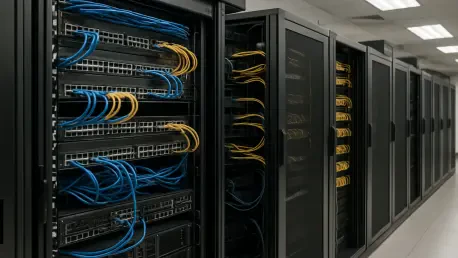In an era where digital infrastructure is expanding at an unprecedented pace, the demand for resources to support data centers has become a pressing global concern, particularly in regions experiencing rapid technological growth like Johor, a state in southern Malaysia. Johor stands at the forefront of this challenge, grappling with the need to balance industrial expansion with environmental responsibility. With massive investments pouring into data center projects, the state faces an escalating demand for water and energy, critical components for cooling and operating these facilities. Yet, Johor has emerged as a trailblazer by implementing innovative water management strategies that could serve as a blueprint for sustainable industrial growth. Through strategic partnerships and forward-thinking policies, the state is addressing the resource crunch head-on, ensuring that technological advancements do not come at the expense of the environment. This remarkable initiative highlights a path toward harmonizing progress with sustainability.
Addressing the Resource Challenge
Innovative Water Recycling Partnerships
Johor has taken a groundbreaking step by fostering collaborations between data center operators and local water management entities to tackle the immense water needs of these facilities. Notably, Bridge Data Centres (BDC) and Computility Technology (Malaysia) Sdn Bhd have entered into agreements with Johor Special Water (JSW) to utilize reclaimed water from treated effluent for cooling purposes. This marks a historic milestone, as Johor becomes the first state in Malaysia to integrate wastewater recycling into data center operations. BDC’s plant in Ulu Tiram has been operational since mid-year, processing treated effluent into high-grade water for its systems. Meanwhile, Computility is gearing up to launch similar efforts in Iskandar Puteri by the end of the year. These initiatives not only reduce the strain on potable water supplies but also demonstrate a viable model for other regions facing similar challenges, showcasing how industrial needs can align with environmental conservation through innovative resource management.
Expanding Water Supply Solutions
Beyond recycling, Johor is diversifying its water sources to meet the growing demands of data center operations. DayOne Data Centres Sdn Bhd has secured a deal with JSW to access raw water from the Tebrau River for its upcoming facility in Kempas Tech Park, set to commence operations soon. This approach reflects a broader strategy to incorporate alternative water supplies such as raw, reclaimed, and even desalinated water to support industrial growth. The state is also managing an overwhelming volume of requests, with JSW receiving applications for up to 136 million liters of alternative water daily. To handle this, a dedicated coordination committee has been established to oversee data center developments and prioritize sustainable resource allocation. By exploring multiple avenues for water procurement, Johor ensures that the rapid proliferation of data centers does not overwhelm local reserves, setting a precedent for proactive resource planning in high-growth sectors.
Driving Sustainable Industrial Growth
Balancing Expansion with Environmental Goals
The surge in data center projects in Johor underscores the urgency of sustainable practices amid significant economic investment. By the second quarter of the current year, over 50 applications for data center construction have been submitted, representing investments worth RM164.45 billion, with 42 already approved. Additionally, seven new proposals are under review, collectively requiring up to 76 million liters of water per day. This rapid expansion necessitates a delicate balance between economic progress and resource preservation. The state’s response, through the Johor Data Centre Development Coordination Committee, emphasizes renewable energy and alternative water sources to mitigate environmental impact. This holistic approach not only addresses immediate needs but also lays the groundwork for long-term sustainability, ensuring that technological hubs can thrive without depleting critical resources or compromising ecological stability.
Setting a Global Standard through Collaboration
A key element of Johor’s strategy lies in the collaborative efforts between government bodies, private companies, and water management authorities. JSW, working alongside Indah Water Konsortium (IWK), supplies alternative water for cooling systems, significantly reducing reliance on freshwater reserves. A prime example is BDC’s reclamation plant in Desa Cemerlang, Ulu Tiram, which processes four million liters of treated effluent daily from a nearby sewage treatment facility into pure water through a dedicated pipeline. This large-scale effort, currently in its final testing phase, highlights the potential for innovative solutions to redefine industrial water use. Such partnerships exemplify how public-private cooperation can address resource challenges, positioning Johor as a leader in sustainable data center operations. This model of collaboration offers valuable insights for other regions, proving that strategic alliances can drive both technological advancement and environmental stewardship.
Reflecting on a Sustainable Legacy
Looking back, Johor’s journey in pioneering sustainable water use for data centers was marked by bold initiatives and strategic foresight. The partnerships forged between JSW, BDC, Computility, and DayOne showcased practical applications of wastewater recycling and alternative water sourcing that alleviated pressure on local resources. The state’s proactive establishment of oversight mechanisms ensured that the influx of investments did not overshadow environmental priorities. Moving forward, the focus should remain on scaling these solutions, encouraging other regions to adopt similar frameworks, and investing in research for even more efficient technologies. Exploring additional renewable energy options alongside water innovations could further solidify Johor’s position as a global benchmark. These steps, rooted in the successes achieved, pave the way for a future where industrial growth and ecological balance coexist seamlessly, inspiring a broader movement toward sustainability in technology-driven landscapes.









